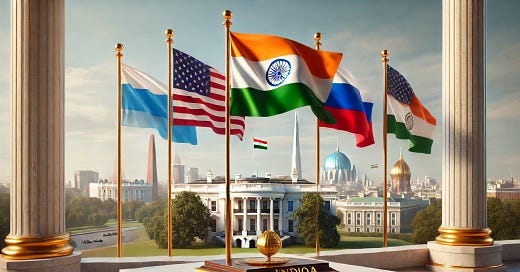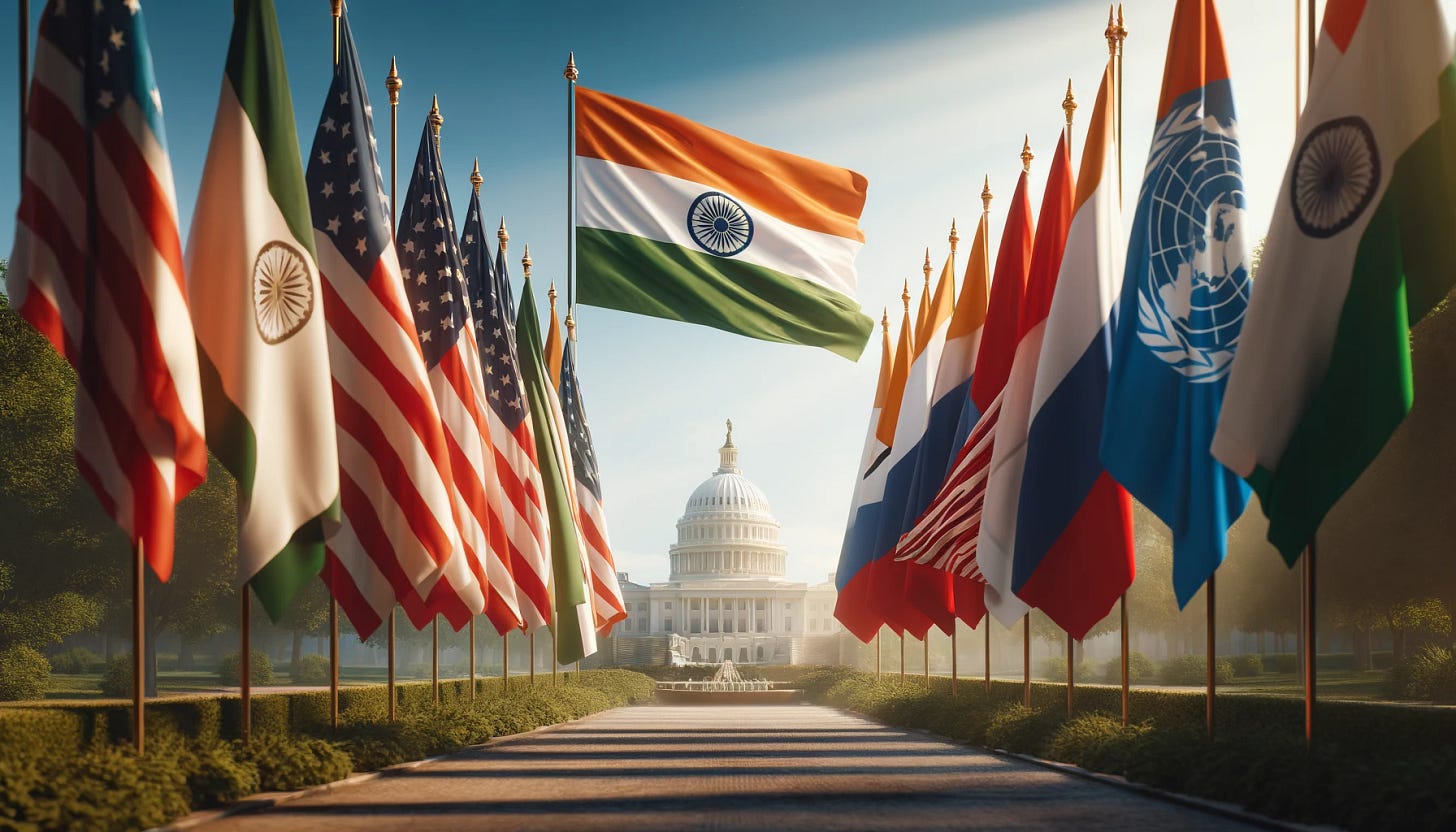Are India’s Foreign Service and Intelligence Agencies at Loggerheads? Finding a Sweet Spot in Foreign Policy
The Evolving Dynamics of Indian Foreign Policy: Diverging Views and Strategic Challenges
The Evolving Dynamics of Indian Foreign Policy
Sovereign Authority and the Role of the Prime Minister
India, as a sovereign state, operates with the Prime Minister at its helm, supported by a Council of Ministers, popularly referred to as the Cabinet. Historically, foreign policy and India’s relationships with other countries have been primarily managed by the Ministry of External Affairs (MEA), with the Prime Minister’s inputs integrated into the MEA's policy formulation. On the floor of Parliament, it is often seen that the ruling and opposition parties present a united front on foreign policy issues, emphasising a collective stance for the world to see.
Involving the Opposition in Foreign Affairs: A Tradition of Unity
In previous decades, Prime Ministers such as Jawaharlal Nehru and Indira Gandhi inducted senior opposition leaders to symbolise India's united stance, both with specific countries and in multilateral forums. For example, Prime Minister Gandhi famously requested Atal Bihari Vajpayee to lead the Indian delegation in explaining India’s nuclear stance. However, in today’s globalised world, where events in one country are instantaneously broadcast and disseminated worldwide, India’s interaction with the global community cannot be managed solely by the MEA.
Expanding India’s Global Representation
Artists, journalists, intellectuals, scientists, and sports persons have been formally and informally encouraged to represent India abroad, complementing the core diplomatic function of the MEA. The MEA’s mandate extends beyond just Indian Foreign Service (IFS) officers and also includes IAS and IPS officers and armed forces personnel for trade, commerce, and security issues.
Emerging Fault Lines Within India's Foreign Policy Machinery
Based on my interactions with the Indian state machinery, both in central government ministries and senior political leadership, i get a distinct feeling the difference in opinion and approaches— if not divisions— have begun to surface. There are increasingly distinct perspectives between the MEA’s approach, led by IFS officers, and the views of intelligence agencies like the Research and Analysis Wing (RAW), the Intelligence Bureau (IB), and the National Investigation Agency (NIA).
While differing opinions between the MEA and the Ministry of Commerce over strategic interests are not new, it appears that two fundamentally different perspectives are forming regarding India’s approach to major global powers, particularly the United States, Russia, and China, as well as our immediate neighbourhood.
The Canada-United States Incident and Its Fallout
The recent alleged assassination of Hardeep Singh Nijjar, a Canadian national with Khalistani ideologies, and the purported conspiracy to neutralise Gurpatwant Singh Pannu, a US-based Sikh separatist, have accentuated these differences. Canada’s and the United States' responses have strained India’s diplomatic relations with both countries. The specifics of these incidents are beyond this article’s scope, but it is evident that they have not improved India’s standing with the US or Canada, both of which have a substantial Sikh diaspora. The MEA has traditionally maintained that strategic interests must be addressed with patience and diplomacy, using subtle negotiation and give-and-take.
Diplomatic Patience Versus Proactive Security Measures
Contrastingly, intelligence agencies argue that India, often perceived as a "soft state," should assert its national interests more forcefully, following the precedent set by nations like the United States, which conducted the high-profile raid on Osama bin Laden in Pakistan. The successful surgical strike by the Indian Air Force in Pakistan has emboldened this camp, which now believes India has both the capacity and the will to target designated terrorists, even if they reside in countries with which India has diplomatic ties.
According to this perspective, the assassination of Hardeep Singh Nijjar, as alleged by Canadian Prime Minister Justin Trudeau, was part of a new proactive policy to protect India’s sovereignty—a claim the MEA has firmly denied. Some believe the Indian High Commission itself may have been unaware of the operation, given instructions were reportedly coming from higher authorities in New Delhi.
Internal Division: Diplomatic Corps Versus Intelligence Agencies
As the MEA and intelligence agencies have internally clashed, MEA officials claimed that their long-term strategy had been derailed by a "Rambo attitude" within certain security agencies, which allegedly worsened relations with Canada. In response, the security agencies argued that they were risking their lives to safeguard India’s interests, whereas diplomats were playing it safe.
Adding to this discord, a new narrative in bureaucratic and political circles suggests that some diplomats appear to prioritise foreign interests, especially the United States, due to personal affiliations, such as their children’s education or their own green cards and residency in the US, and the possibility of taking up lucrative post-retirement assignments with some US-based think tanks which are for all intents and purposes an extension of their intelligence apparatus.
Leadership and Hierarchical Challenges in Foreign Affairs
The MEA, headed by Union Minister S. Jaishankar—a seasoned diplomat—has adeptly adapted to political leadership. However, Jaishankar's lack of seniority compared to the Home and Defence Ministers reportedly puts the MEA at a slight disadvantage, limiting the scope of his influence over the intelligence agencies, especially in intersecting areas.
Balancing Strategic Interests: The United States and Russia
One significant area of disagreement is how India should balance its strategic interests between the US and Russia. The MEA advocates for a positive relationship with the US, noting its importance in providing advanced technology. In contrast, intelligence and defence lobbies argue that Russia remains essential, particularly given India’s ongoing oil imports paid in rupees even as we comply fully with US sanctions on Iranian oil. They also highlight that Europe continues to import Russian energy despite the Ukraine crisis, contending that India should not be apologetic for maintaining cordial relations with Russia.
The MEA advocates a balanced approach, aiming to preserve the strategic status quo with Russia while safeguarding vital relationships with the United States and its allies, including Quad members. Regarding China, the MEA believes India should present itself as a responsible neighbour, committed to resolving border issues and enhancing trade. Simultaneously, India must address security concerns related to Chinese technology and act as a bulwark against China's growing influence in its immediate neighbourhood.
A Call for Unified Foreign Policy Leadership
The longstanding division between the MEA and intelligence agencies is not new, but the level of divergence appears to be at an all-time high. Under Prime Minister Narendra Modi’s leadership and his rapport with leaders like the new US President-elect Donald Trump, there is an expectation that these internal aberrations will be smoothed out.
Indian diplomats and intelligence agencies must operate in unison, aligning their perspectives to advance India’s overriding sovereign interests as envisioned by the Prime Minister, with inputs from the Home and External Affairs Ministries. Their collective focus should be on countering Chinese expansion in the Indian Ocean and boosting India’s trade and commerce, thereby reinforcing India’s stature as a strong, cohesive global player, with excellent relations both the USA and Russia as well as with the various stakeholders in the Middle East. India today is no longer a third-world or non-aligned nation reminiscent of the Nehruvian era; it is a bold and assertive democracy, confidently claiming its rightful place at the high table in the comity of nations. Petty differences between various branches of the government should not be allowed to hinder India’s strides on the global stage.






……..Undoubtedly, the intelligence agencies must heed and act under the advice of External Affairs Ministry, since the international affairs are best understood by the concerned Ministry…!!